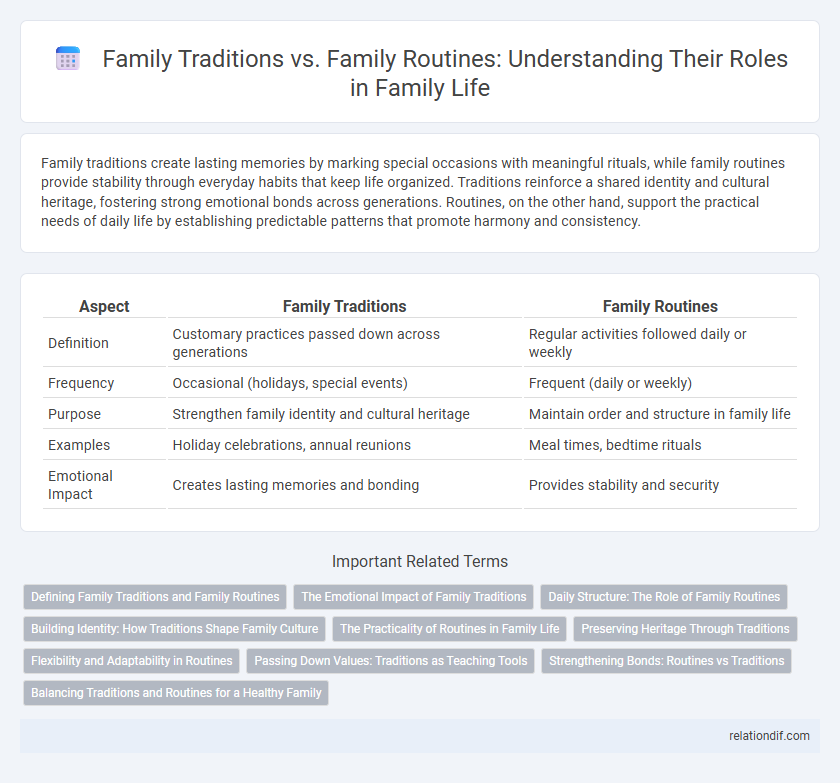Family traditions create lasting memories by marking special occasions with meaningful rituals, while family routines provide stability through everyday habits that keep life organized. Traditions reinforce a shared identity and cultural heritage, fostering strong emotional bonds across generations. Routines, on the other hand, support the practical needs of daily life by establishing predictable patterns that promote harmony and consistency.
Table of Comparison
| Aspect | Family Traditions | Family Routines |
|---|---|---|
| Definition | Customary practices passed down across generations | Regular activities followed daily or weekly |
| Frequency | Occasional (holidays, special events) | Frequent (daily or weekly) |
| Purpose | Strengthen family identity and cultural heritage | Maintain order and structure in family life |
| Examples | Holiday celebrations, annual reunions | Meal times, bedtime rituals |
| Emotional Impact | Creates lasting memories and bonding | Provides stability and security |
Defining Family Traditions and Family Routines
Family traditions are meaningful customs and rituals passed down through generations that strengthen bonds and create lasting memories. Family routines consist of everyday activities and habits that provide structure and stability within the household. Both traditions and routines play essential roles in fostering a sense of identity and continuity in family life.
The Emotional Impact of Family Traditions
Family traditions create lasting emotional bonds by reinforcing a shared sense of identity and belonging, which routines often lack. These rituals evoke cherished memories and foster emotional security that strengthens familial connections across generations. Engaging in family traditions reduces stress and promotes emotional well-being by providing consistent opportunities for joyful interaction and mutual support.
Daily Structure: The Role of Family Routines
Family routines establish a consistent daily structure that enhances stability and predictability for all members, fostering emotional security and effective time management. Regular activities such as shared meals, bedtime rituals, and morning preparations help reinforce family bonds while creating a sense of order and cooperation. These routines differ from family traditions by occurring daily, emphasizing practical organization over ceremonial significance.
Building Identity: How Traditions Shape Family Culture
Family traditions play a crucial role in shaping a family's identity by creating meaningful rituals that reinforce shared values and cultural heritage. These traditions, such as holiday celebrations or storytelling, cultivate a sense of belonging and continuity across generations. In contrast, family routines provide structure but lack the emotional depth and symbolic significance that traditions impart to family culture.
The Practicality of Routines in Family Life
Family routines provide structure and predictability, essential for managing daily responsibilities like meal times, homework, and bedtime. These practical habits foster consistency, reduce stress, and enhance time management for both parents and children. Regular routines support children's development by creating a stable environment that promotes healthy habits and emotional security.
Preserving Heritage Through Traditions
Family traditions serve as vital cultural touchstones that preserve heritage by passing down stories, values, and rituals across generations. Unlike daily routines, these traditions foster a sense of identity and continuity, embedding historical significance into shared experiences. By engaging in regular celebratory practices, families reinforce bonds and ensure that ancestral legacies remain vibrant and relevant.
Flexibility and Adaptability in Routines
Family routines provide structure and predictability, yet their true value lies in flexibility and adaptability to accommodate changing needs and circumstances. Unlike rigid traditions, adaptable routines support emotional well-being by allowing families to respond effectively to new challenges or opportunities. Emphasizing flexibility in daily practices fosters resilience and strengthens family bonds through dynamic interactions and shared experiences.
Passing Down Values: Traditions as Teaching Tools
Family traditions serve as vital teaching tools that pass down core values, beliefs, and cultural heritage from one generation to the next. These rituals create meaningful experiences that embed lessons about respect, responsibility, and unity, fostering a strong sense of identity and continuity. Unlike daily routines, traditions are intentional acts designed to reinforce family bonds and ethical foundations over time.
Strengthening Bonds: Routines vs Traditions
Family traditions create meaningful, recurring experiences that foster a deep sense of identity and shared values, strengthening bonds through intentional celebration and storytelling. Family routines, such as daily meals or bedtime rituals, provide consistent opportunities for connection and stability, reinforcing trust and emotional security. Both traditions and routines complement each other by nurturing long-term relationships and promoting a cohesive family environment.
Balancing Traditions and Routines for a Healthy Family
Balancing family traditions and routines creates a structured yet meaningful environment that nurtures emotional well-being and stability. Traditions foster a sense of identity and belonging through shared values, while routines provide consistency and predictability essential for daily functioning. Integrating both enhances family cohesion by combining the warmth of cultural heritage with the reliability of everyday habits.
Family traditions vs Family routines Infographic

 relationdif.com
relationdif.com